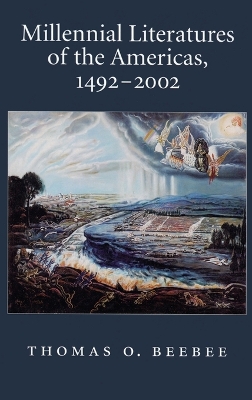Imagining The Americas
1 total work
This bracing and far-ranging study compares modern (post-1492) literary treatments of millenarian narratives-"end of the world" stories charting an ultimate battle between good and evil that destroys previous social structures and rings in a lasting new order. While present in many cultures for as long as tales have been told, these accounts take on a profound dramatic resonance in the context of Europe's centuries-long colonization of the American hemisphere.
With an impressive interdisciplinary approach that employs insights from history, ethnography, and theology, Thomas O. Beebee provides nuanced readings of the apocalyptic vision in a diverse group of forms and writers, stretching from the letters of Christopher Columbus to the lyrics of Bob Marley and Bob Dylan, the poetry of Ernesto Martinez, and the bestselling novels of the Left Behind franchise, among other works. Throughout, he pointedly illustrates how millennial discourse
has been used as a technology of control to further national and imperial agendas while paradoxically, often simultaneously, serving the forces of resistance. Drawing on a wide variety of records, his analysis shows that repeated eruptions of imagined, epochal conflicts reveal native populations fighting against
the eradication of traditional ways of life, making sense of unprecedented violence, and searching for sources of origin. It seems that Americans-North, South, Middle, and Caribbean-tend to define themselves by narrating their End.
Informed by extensive research and an imaginative marshalling of diverse insights, Beebee presents a comprehensive comparative treatment of millennial themes in works from English, French, Portuguese, and Spanish. In so doing, he illustrates that prophesies of telos, and the literature that imagines them, provide a vital context for understanding the connected yet distinct cultures that have shaped the American hemisphere.
With an impressive interdisciplinary approach that employs insights from history, ethnography, and theology, Thomas O. Beebee provides nuanced readings of the apocalyptic vision in a diverse group of forms and writers, stretching from the letters of Christopher Columbus to the lyrics of Bob Marley and Bob Dylan, the poetry of Ernesto Martinez, and the bestselling novels of the Left Behind franchise, among other works. Throughout, he pointedly illustrates how millennial discourse
has been used as a technology of control to further national and imperial agendas while paradoxically, often simultaneously, serving the forces of resistance. Drawing on a wide variety of records, his analysis shows that repeated eruptions of imagined, epochal conflicts reveal native populations fighting against
the eradication of traditional ways of life, making sense of unprecedented violence, and searching for sources of origin. It seems that Americans-North, South, Middle, and Caribbean-tend to define themselves by narrating their End.
Informed by extensive research and an imaginative marshalling of diverse insights, Beebee presents a comprehensive comparative treatment of millennial themes in works from English, French, Portuguese, and Spanish. In so doing, he illustrates that prophesies of telos, and the literature that imagines them, provide a vital context for understanding the connected yet distinct cultures that have shaped the American hemisphere.
